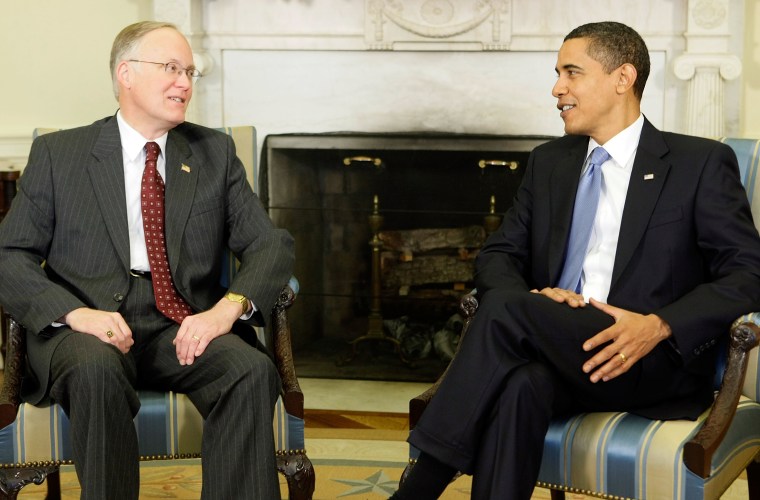President Barack Obama said Monday that "very modest differences" over a massive package to revive the economy should not delay its swift passage, a fresh appeal to Congress as the nation dealt with another dose of dire financial news.
Obama teamed up with Vermont Gov. Jim Douglas, the Republican vice chairman of the National Governors Association, as he sought bipartisan backing for the stimulus legislation. An $819 billion version passed the House last week, without a single Republican vote. The Senate took up their $900 billion version on Monday.
GOP lawmakers argue that the plan is too expensive and doesn't include enough tax cuts.
"If I were writing it, it might look at little different," said Douglas, who sat at Obama's side in the Oval Office. "But the essence of a recovery package is essential to get the nation's economy moving."
Douglas is among several GOP governors who are breaking with their Republican colleagues in Congress to ask for approval of the plan. Douglas is in Washington to lobby the Senate.
Obama said that those who really know what is needed around the country — governors — have been asking for help from Washington since he was elected in November.
"With very few exceptions, I heard from Republicans and Democrats the need for action, and swift action," Obama said.
Obama and Vice President Joe Biden were scheduled to meet at the White House Monday afternoon with Democratic congressional leaders about the stimulus package.
Obama's appeal came as the Commerce Department reported that personal spending fell for the sixth straight month in December by 1 percent. Analysts had predicted a decline of 0.9 percent. Incomes also dipped, and the personal savings rate shot higher, a sign that consumers remain extremely nervous about the economy.
The department also said construction spending dropped by 1.4 percent in December, slightly worse than the 1.2 percent decline economists expected.
Earlier Monday, Obama promised to establish a review board to oversee the government's separate $700 billion financial industry bailout program. Aides said later that he meant to refer to a oversight board for the stimulus package, as is called for in the legislation.
He also signaled it is likely that his administration will ask for more money for that program beyond the $700 billion.
"We can expect that we're going to have to do more to shore up the financial system," Obama said.
An announcement is expected next week on how the Obama administration plans to use the last $350 billion of that effort, which has come under heavy congressional and public criticism.
The president said he was taking full responsibility for rescuing the U.S. economy, in its worst downturn in 80 years.
Already looking ahead to the 2021 presidential election, Obama said: "If I don't have this done in three years then there's gonna be a one-term proposition." He spoke during an interview taped Sunday and aired Monday on NBC's "Today" show.
The massive infusion of taxpayer money into the financial sector has largely failed to thaw the nation's credit markets, while some financial institutions used the money to pay dividends, buy other banks and pay out big year-end bonuses to employees.
Obama said some of the nation's banks would have to write down bad debts, while other banks may fail.
"It is likely that the banks have not fully acknowledged all the losses that they're going to experience. They're going to have to write down those losses. And some banks won't make it," he said.
While keeping up a drumbeat of dire predictions in the short term, Obama assured Americans that their bank accounts were not in danger.
"All deposits are gonna be safe for ordinary people. But we're gonna have to wring out some of these bad assets," he said.
The president demurred when asked if he planned to set up a so-called "bad bank" under which the federal government would take on the bad debts and investments of financial institutions. He suggested, however, that something like that was in the works, and that taxpayers would become owners of stock in those banks and investment houses.
"We're going to have to ring out some of these bad assets," he said.
